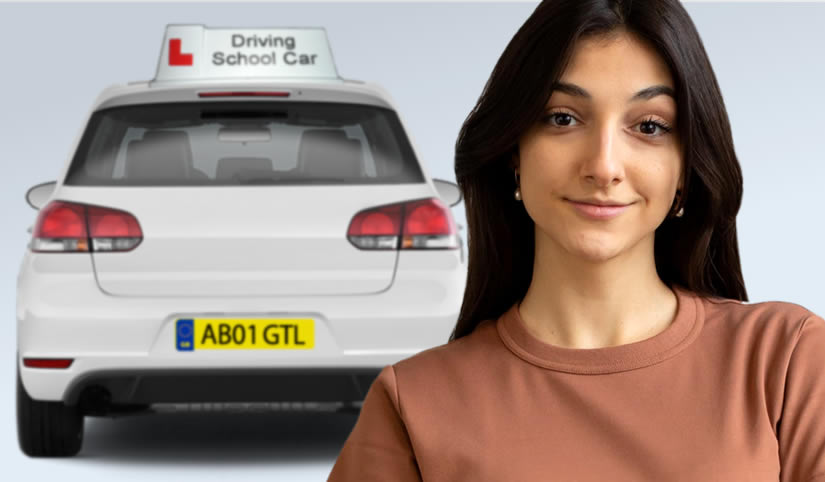First driving lesson nerves is normal and is actually a good thing. In our experience, those that are overconfident ultimately tend to make more mistakes as they tend to be less cautious. However, if you are suffering with excessive first driving lesson nerves and anxiety, we’re going to help by explaining a little about the driving instructor and exactly what they’ll be expecting from you.
Starting Off Quietly
First things first, if you’re worried that you’re going to be expected to drive on busy streets on your first lesson, that’s not going to happen.
If you live in a busy area with lots of traffic, then that’s not going to be where you start. Instead, your instructor is going to drive you to a quiet residential street to begin the lesson. It’ll be an quiet area with not much going on, ideal for your first driving lesson.
Fear of Being Overwhelmed
A fear of being overwhelmed is common and particularly heightened by individuals that suffer from mental health problems such those within the Autism spectrum.
On your first lesson, the instructor will ask you to sit in the driver’s seat and explain how to adjust the seat and steering so that you can comfortably reach all the controls. They will then explain car’s foot controls, hand controls and other essential controls such as the indicators and finally, they will run through how to set up the car’s mirrors. This is all called the cockpit drill. After the cockpit drill, you might also go for a short drive.
This might seem like a lot to take in all in the space of two hours and you’re right, it is. But there’s no need to be overwhelmed because the instructor doesn’t expect you to remember everything. Even if you remember absolutely nothing, it’s fine because the instructor will help you throughout your lessons by continually reminding you (they call it prompts) on what to do.
You see, it’s not an instructor’s job to get you to test standard in the quickest time possible, it’s their job to teach you and to use methods that they can adapt so that you find it easy to understand.
Instructors are trained so that they can teach individuals of all abilities and this includes those that suffer from extreme nerves and anxiety.
It’s Good to Talk
Not everyone likes talking about what’s on their mind and for some, they can feel like a burden if they do. But it’s good to talk, it helps to relieve anxiety and stress and it’ll help your instructor know exactly how you’re feeling so that they can better adapt their teaching.
Have a chat with your instructor at the start of your first driving lesson about how you feel. The instructor will then help to put you at ease by explaining what’s going to happen during the first lesson and that you’ll not be expected to remember everything. This applies to not only the first lesson, but all lessons.
Learning at Your Own Pace
Not only during the first driving lesson, but throughout all of your lessons, you’ll be learning at your own pace. You set the speed at which you want to learn, not the instructor.
Again, this is part of the instructor’s training. They adapt the speed at which they teach based on the individual that they’re teaching. Instructors can usually find an appropriate speed for teaching any particular individual, but if you think things are going a little too fast, simply mention it and the instructor will take it from there. Remember the instructor is there to teach and help, not to push you beyond your ability.

Take a Break
This applies to all driving lessons and not just the first. If you’re feeling overwhelmed, ask the instructor if you can take a break. Feel free to safely exit the car breath in some fresh air or even take a walk if you need to. When you’re done, you can continue with the lesson. The instructor will not mind you doing this at all.
It’s Good to Make Mistakes
Everybody makes mistakes on driving lessons, it’s how we learn and instructors are perfectly used to this. On each lesson, there’s going to be things that go well and things that don’t go quite so well. That’s normal for everyone. But if you’re particularly anxious, then you’re probably sitting there thinking that you’ll never get the hang of any of it and instead make a series of mistakes.
Well, the good news is that you will get the hang of it. But you will make mistakes and you wont remember all of it, just like each and every learner driver before you.
Everyone can feel a little overwhelmed after a lesson because there’s quite a lot to take in. What can help is to go away after your lesson and write about the things that you think went well and things that you think didn’t go so well. You can then discuss this with your instructor at the start of your next lesson. This is not only good for you, but instructors like this because they will refresh your memory and go over the things that you’re not so confident on.
Set yourself small goals. The things that went well are goals that you have achieved and the things that didn’t go so well are areas that need revisiting.
Fear of Losing Control
The first driving lesson usually ends with a short drive (if there’s time). It involves the driving instructor explaining what safety observations you need to do before moving the car off and before parking up again. They’ll also explain if and when to use the indicators and depending on whether you’re driving manual or automatic, they’ll explain how to select the applicable gear and what foot pedals to use.
They explain all of this with the use of diagrams and when it comes to you driving the car, it will only be for a short distance and the instructor will once again explain what you need to do throughout the process of moving off and parking up again. It’ll all be explained before you do and while you do it.
It’s part of an instructor’s training to ensure that you know what you need to do before you do it and to be explained again while you do it. It’ll be a highly controlled and slow process and in the extremely unlikely event anything goes wrong, all driving instructor’s car have dual controls so that the instructor can take control should the need arise.
Help for Reducing First Driving Lessons Nerves
Remember that instructors are not only trained to teach people to drive, but are also trained to help those with anxiety, high stress levels and those with high levels of nervousness. If you are feeling nervous, use some of these techniques:
- Talk to your instructor about how you feel
- Set yourself small goals
- If you feel overwhelmed, ask the instructor to slow things down
- If you feel overwhelmed, ask the instructor to take a break
- Making mistakes is good, it’s how we learn
- Write down the good and bad things after each lesson and talk to the instructor about them
- You’re safe due to all driving school cars having dual controls

can my my mum teach me how to drive I have never driven before she insured on her can car an get l plates on front and back does she need anything else
Hi Jamie,
Your mum will need to ensure that her insurance covers her to teach a learner driver. If it doesn’t, she will need to contact her car insurance provider and have you insured as a named driver. You can also get dedicated insurance for learner drivers, some of which you can essentially switch on and off as you need it. So might be worth looking around for various options and deals. As you said, you’ll also need L-plates, front and back. Other things you’ll need and which I’m sure you’re aware of is you need to have your provisional driving licence.
The most important thing is insurance, as the penalties can be harsh if caught uninsured. Another thing that might be worth asking, is that if you are insured as a named driver on her current policy and there’s an accident, will it affect your mum’s no claims bonus.
can my mum teach me how to drive I am insured and my mum has been driven 4 years and over I have got a provisional she fully insured for me got l plates on front and back could my brother sit in the back of the when I am driven
Hello Jamie,
Yes, provided that your mum has had a full licence for 3 years and she’s qualified for the type of vehicle that she’ll be teaching you in, then it’s fine. Yes, your brother can also sit in the back.